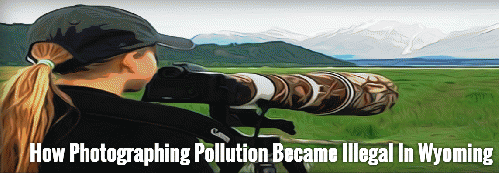Reprinted from theantimedia.org
Taking scenic pictures anywhere outside city limits in the state of Wyoming could now get you thrown in jail. Signed into law in March, the Data Trespass Bill enhances laws against trespassing, but the intent of the bill seems to be clear -- protecting polluters from prosecution by criminalizing the collecting of evidence against them.
No, it's not exactly as simple as just snapping a photo, but if you want to "collect resource data" without express consent to do so and you intend to pass it on to a government agency, the penalties include a fine of up to $5,000 and/or a year in prison.
Under the law's sweeping language, "to collect" means to "take a sample of material, acquire, gather, photograph or otherwise preserve information in any form from 'open land' which is submitted or intended to be submitted to any agency of the state or federal government." With such a sweeping definition, proving the intention to pass along such evidence might not be so difficult, and could potentially include taking a picture of, say, Yellowstone.
One of the key differences between this law and traditional criminal trespass is you don't have to knowingly wander onto restricted land, so an honest mistake could still mean you're guilty. Of great concern is the need to hold polluters accountable for violations of the Clean Water Act, and those who knowingly pollute waterways aren't likely to give the required verbal or written permission for anyone to collect samples of their transgressions. Even if you feel going to prison is a fair price to pay for exposing a polluter, you're out of luck as the law nullifies any data collected under such circumstances.
A key element of the Clean Water Act is reliance on public citizens to spot violations, but this trespass law, and similar legislation in other states including Idaho and Utah, renders citizen science helpless, even in the event of imminent threat to public health. What these laws essentially accomplish is putting rights of their state agricultural industries above the rights of citizens not to have our shared land fouled with pollutants. Rather than addressing the root of the issue, the law shows a preference for sweeping the problem under the rug.
The law came into being after activists with the Western Watersheds Project heavily sampled waterways under the control of the Bureau of Land Management and found the water tainted with E.coli bacteria, which is extremely dangerous to humans. Cattle ranchers, whose livestock is likely responsible for the contamination, then sued the group for trespassing since they allegedly crossed private land to reach the publicly held property to obtain samples. If found to be in violation of the Clean Water Act, the ranchers face tighter restrictions for where their cattle are permitted to graze. Under the new Data Trespass Bill, those activists would be guilty and the evidence they collected unusable against the ranchers.
In a statement given to ThinkProgress, Connie Wilbert from Wyoming's chapter of the Sierra Club explained, "We are deeply concerned that this poorly written and overly vague bill will prevent concerned citizens and students from undertaking valuable research projects on public lands, out of fear of accidentally running afoul of the new law (the scope of which no one clearly understands) and being criminally and civilly prosecuted. There is no need for this new bill, and we can only conclude that it is an attempt by private landowners to scare people away from valid research efforts on public land."
This law creates a double negative, as a violation of environmental regulations must be reported in order to ensure its effectiveness in protecting public safety, but without recourse when that breach is discovered, people aren't able to collect such evidence without facing penalties or causing their data to be inadmissible.
However, there may be some recourse. as pointed out by assistant law professor Justin Pidot in Slate, Wyoming's law is unconstitutional in several ways. Federal environmental statutes take precedence over state law, and this legislation makes it impossible for citizens to gather the necessary data pursuant to enforcement of federal law. The First Amendment right to free speech is also violated as it singles out artistic and other expression when natural resources are the subject matter, and makes petitioning the government impossible since handing data over to a state or federal agency would be a breach of this state law.
Until the law is changed, citizen scientists are forced into the ridiculous position of asking permission from suspected polluters to enter their land and gather evidence of their illegal pollution.
T his article is free and open source. You have permission to republish this article under a Creative Commons license with attribution to the author and TheAntiMedia.org.





